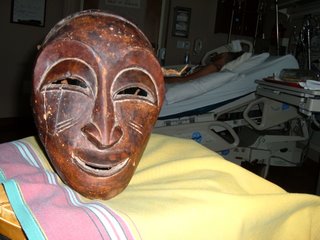Blessing
This one goes out to my girls Laura, A’lishya and Jenn…Don’t nobody love me the way that you do.
A few nights ago, I was awoken around three or four by what felt like a sharp cramp in my chest and belly. Earlier in the night, after feeling a bit of discomfort in my abdomen, I had taken two oxycodone before heading to bed. Oxycodone is a fairly potent pain killer. But what I learned upon being so abruptly awoken is that often times, drugs like this come with more nasty side effects than benefits. It felt as though the lining in my stomach and intestines had been sandpapered down. I crawled into James and Erin’s room and woke them up for assistance. They snapped to attention militarily, Erin springing from her bed, still half asleep, yelling “I’m on it!” Before “it” had been fully understood, I was being led back into my bedroom by James. Erin descended on my bed with tea tree oil for my forehead, lavender for my pillow, and gentle massages for my arms. The truth is, in times like this, there’s very little that can be done. Erin’s often mentioned to me that the most difficult part of this whole ordeal has been the moments when I’m in extreme pain and there’s little she can do to take it away. So the goal is not to make the pain go away, but to work through it, to breath through it and even, if possible, relax into it. James held my hand, closed his eyes, and began breathing deeply. It’s a difficult challenge to help me breath deeply when I’m in pain; it brings up a considerable amount of emotion. There were many places I could go emotionally, but I needed their guidance to keep me calm. I’ve learned over seven months of chemo that in times like this—in fact, pretty much in general—the most important thing I can do is keep my body in a calm, relaxed state. James brought our speakers and laptop into the room and turned on Led Zeppelin. Erin held my body as it shuddered and writhed, and slowly began to settle back into repose. Thirty minutes later, I was calm, drifting peacefully to the sounds of “Stairway to Heaven.”
As I fell asleep, my mind drifted to earlier in the day when I had taken Traxx up to the Hunstman Center to pick up a prescription. I was so proud of my newfound independence; it’s been a while since I ‘took myself out.’ I’d stopped in the computer room to print off an essay for a fellowship I’m applying to, and noticed a middle-aged woman sitting a few seats down from me. We were the only two in the room. She chatted idly on her phone with a friend about this and that. “I was born in Kearns,” she bubbled, “and I’ve stayed here m’ whole life.” Usually a statement like this gives me the shivers. This woman seemed to me the prime example of how outside I feel sometimes in Utah, with my Mohawk and my love of quinoa. The woman was explaining to her friend how a loved one was going in for surgery that afternoon. The challenge was to find a Mormon priesthood holder to give the patient an anointed blessing before surgery. The procedure, fairly familiar to me from my church-going days, can be complicated to orchestrate. She had to find the right people, coordinate their work schedules for the afternoon. And then there was the question of where one might find a vial of consecrated olive oil at last minute’s notice. Dilemmas. We felt a world away, though only separated by a few chairs. In my corner, I sat with my i-pod and my 25-year old smugness, and rolled my eyes at the conversation I was forced to listen to by nature of this woman’s loud voice. How very Utah, I thought. Round up the church members and give the invalid a blessing! Perhaps prepare a casserole while you’re at it.
Fast forward ten hours later, and I am shaking from pain that radiates up and down my body. I have James on one side, holding his hand over my chest, his eyes closed. He is almost praying, he seems so intensely lost in thought. On the other side is Erin, calming me with her voice. In the background, Robert Plant gently sings “laughter…remember laughter?”
For a brief second I saw this woman from earlier in the day again, but with a refocused clarity I had not experienced before. I saw her in me, and me in her. Her voice became my voice, her suffering my own. We’re not as different as I thought. We both believe in something larger, deeper than ourselves. We have to. Ultimately, in a moment of crisis, it is what helps us let go and surrender. We just have different ways of expressing it. As I fell asleep that night, enjoying the profound peace that comes after pain, I let go of my 25-year old brashness—I seem to be doing that a lot—and let myself marinate in love.

